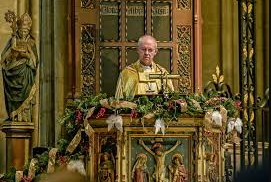Stephen Cottrell expresses remorse over handling of David Tudor sex abuse case as scrutiny mounts
Stephen Cottrell, the Archbishop of York and the second-highest ranking figure in the Church of England, has issued a public apology for his delayed response in the case of David Tudor, a Church of England priest banned for life after admitting to serious sexual abuse involving two girls aged 15 and 16.
Facing mounting pressure to resign, Cottrell stated he is “deeply sorry” for his handling of the situation, particularly as allegations suggest he failed to act decisively during his tenure as Bishop of Chelmsford. Reports indicate that Tudor remained in his position despite being barred by the Church from being alone with children and having paid compensation to a sexual abuse survivor.
The Church of England has since acknowledged the problem, with the BBC reporting a “catalogue of past safeguarding failures” that enabled individuals considered risks in the 1980s to return to ministry in the 1990s. In response, Cottrell maintained that his inaction stemmed from systemic issues and decisions inherited from the past, rather than deliberate negligence.
Cottrell explained that the protocols of the time did not adequately prevent Tudor’s return to ministry, stating: “Changes to the way safeguarding is now managed and scrutinised would mean the decision taken in 1988 would not take place now.” Despite rejecting direct calls to step down, he pledged to oversee reforms to ensure improved safeguarding processes.
Bishop of Newcastle, Helen-Ann Hartley, has declared that Cottrell’s leadership of the Church of England is now “impossible,” citing a lack of accountability and transparency as central issues. These latest developments follow the resignation of Archbishop of Canterbury Justin Welby last month, who stepped down in the wake of findings that his delayed police reporting of abuse by serial offender John Smyth contributed to prolonged suffering among victims.
As the Church of England faces these repeated crises, the conversation surrounding institutional accountability and safeguarding remains at the forefront. Cottrell has vowed to prioritise independent scrutiny moving forward to prevent similar failures in the future.

